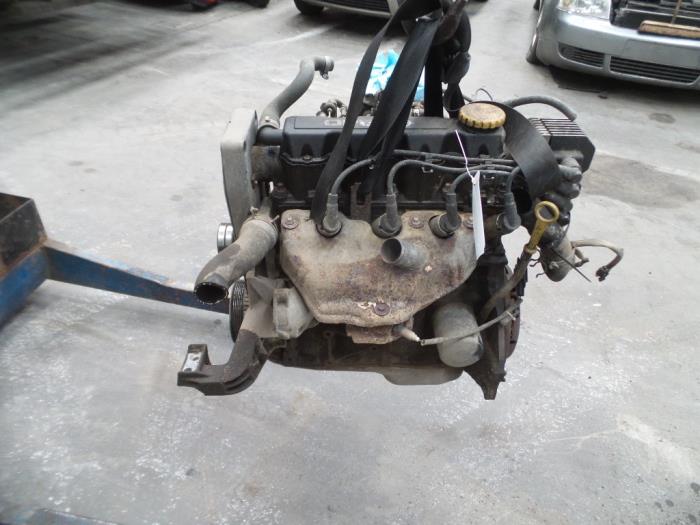Open Exclusive Opel Corsa 1.4 Engine Price Price Cuts at Vehicle Components Specialists
Engine Acquiring Specialist Tips on Selecting the Right Engine for Your Specific Needs
Choosing the best engine for your specific demands includes an intricate interaction of elements that go past simple horsepower numbers. By delving right into the complexities of power versus efficiency, reviewing fuel ratings, and budgeting for long-lasting costs, one can absolutely enhance their engine option.
Power Vs. Effectiveness: Finding the Equilibrium
When selecting an engine, it is critical to strike a balance between power and efficiency to satisfy your particular needs successfully. Power refers to the engine's capacity to produce energy for propulsion, determining aspects like acceleration, pulling ability, and general efficiency - Opel Corsa 1.4 Engine Price. On the other hand, effectiveness connects to how well the engine makes use of fuel to produce power, influencing factors such as fuel economic situation and environmental friendliness
Attaining the right balance in between power and performance is necessary because an engine that is also effective may take in too much gas, leading to higher operating expense and unneeded pressure on the environment. On the other hand, an engine that focuses on performance over power might result in sluggish performance, particularly popular scenarios like towing heavy loads or driving uphill.
To make a notified choice, take into consideration factors such as your common driving conditions, the designated usage of the vehicle, and your personal preferences. By evaluating your requirements and concerns, you can choose an engine that strikes the excellent balance between power and effectiveness, ensuring optimal performance while reducing environmental effect and operating prices.
Understanding Engine Size and Type
To additionally improve the option process of an engine that strikes the optimal balance between power and effectiveness, it is necessary to look into the complexities of understanding engine size and kind. Engine dimension refers to the total volume of air and gas that can be pressed with the engine cylinders. It is usually determined in liters or cubic centimeters. Larger engine dimensions usually lead to more power output yet can additionally bring about reduced fuel efficiency. On the various other hand, smaller engine sizes are often extra fuel-efficient however may give up some power.
Typical engine kinds consist of inline engines, V engines, and rotary engines, each with its special benefits and disadvantages. Recognizing the interplay between engine dimension and type is crucial in picking an engine that aligns with your certain needs and concerns, whether it be power, performance, or an equilibrium of both.

Consider Your Vehicle's Needs
If you are looking for an engine for a heavy-duty truck that will be utilized for towing, you will certainly require an effective engine with high torque abilities. On the various other hand, if you are picking an engine for a small automobile mainly made use of for city commuting, fuel efficiency might be a much more essential factor to consider.
If you often drive in hilly or uneven areas, a robust engine with excellent climbing power will be essential. By straightening the engine requirements with your automobile's needs, you can make certain that your lorry runs effectively and meets your performance expectations.
Reviewing Fuel Effectiveness Scores
Assessing gas effectiveness ratings is a vital element of selecting the appropriate engine for your lorry, making certain price savings and environmental sustainability. Gas efficiency rankings, normally determined in miles per gallon (MPG) for gas engines or kilowatt-hours per 100 miles (kWh/100 miles) for electric engines, indicate just how much an automobile can take a trip on a specific quantity of gas or electricity. Higher MPG or reduced kWh/100 miles values symbolize more effective engines, translating to minimized gas costs and reduced carbon emissions.
Additionally, compare different engine alternatives within the very same lorry class to identify the most economical option. Elements such as engine size, weight, the rules of aerodynamics, and crossbreed or electrical abilities like this can all affect gas effectiveness.
Budgeting for Long-Term Expenses
Purposefully preparing for long-term expenditures is critical when choosing an engine, guaranteeing economic sustainability over the automobile's life expectancy. While the initial acquisition price of an engine is a significant variable, it is critical to think about the long-term prices associated with upkeep, repair services, and fuel intake.
Moreover, investigating the accessibility and price of substitute parts for the chosen engine is crucial in spending plan preparation. By meticulously budgeting for these long-term expenditures and factoring them into the decision-making process, people can pick an engine that not only fulfills their immediate needs but also stays economical throughout its lifespan.
Conclusion
Finally, selecting the best engine for your particular requirements needs balancing power and efficiency, comprehending engine size and type, considering your vehicle's requirements, evaluating gas performance rankings, and budgeting for lasting expenses. By very carefully thinking about these aspects, you can make sure that you select an engine that meets your needs and gives optimum efficiency for your car.
To further improve the choice process of an engine that strikes the optimum balance between power and performance, it is vital to delve right into the ins and outs of understanding engine dimension and type. Engine dimension refers to the overall quantity of air and fuel that can be pressed with the engine cylinders. Usual engine types consist of inline engines, V engines, and rotary engines, each with its one-of-a-kind advantages and downsides. Comprehending the interaction between engine dimension and type is essential in choosing an engine that straightens with your my website certain needs check out here and concerns, whether it be power, efficiency, or an equilibrium of both.
